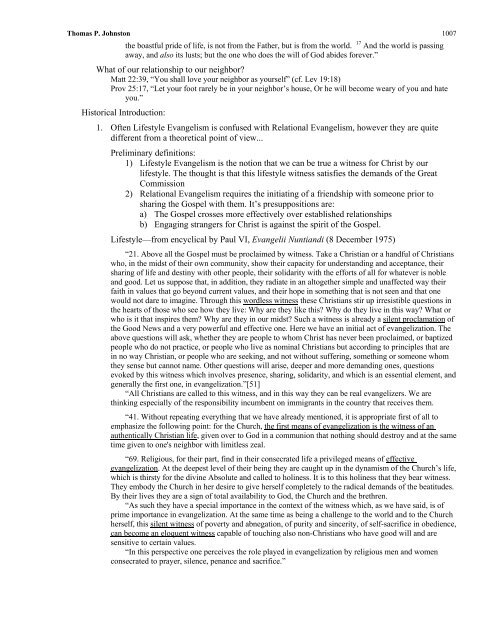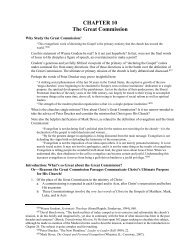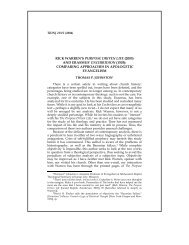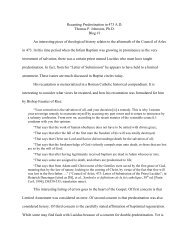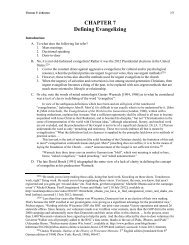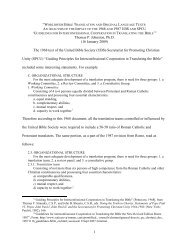Four Categories of Evangelism Programs - Evangelism Unlimited
Four Categories of Evangelism Programs - Evangelism Unlimited
Four Categories of Evangelism Programs - Evangelism Unlimited
Create successful ePaper yourself
Turn your PDF publications into a flip-book with our unique Google optimized e-Paper software.
Thomas P. Johnston 1007<br />
the boastful pride <strong>of</strong> life, is not from the Father, but is from the world. 17 And the world is passing<br />
away, and also its lusts; but the one who does the will <strong>of</strong> God abides forever.”<br />
What <strong>of</strong> our relationship to our neighbor?<br />
Matt 22:39, “You shall love your neighbor as yourself” (cf. Lev 19:18)<br />
Prov 25:17, “Let your foot rarely be in your neighbor’s house, Or he will become weary <strong>of</strong> you and hate<br />
you.”<br />
Historical Introduction:<br />
1. Often Lifestyle <strong>Evangelism</strong> is confused with Relational <strong>Evangelism</strong>, however they are quite<br />
different from a theoretical point <strong>of</strong> view...<br />
Preliminary definitions:<br />
1) Lifestyle <strong>Evangelism</strong> is the notion that we can be true a witness for Christ by our<br />
lifestyle. The thought is that this lifestyle witness satisfies the demands <strong>of</strong> the Great<br />
Commission<br />
2) Relational <strong>Evangelism</strong> requires the initiating <strong>of</strong> a friendship with someone prior to<br />
sharing the Gospel with them. It’s presuppositions are:<br />
a) The Gospel crosses more effectively over established relationships<br />
b) Engaging strangers for Christ is against the spirit <strong>of</strong> the Gospel.<br />
Lifestyle—from encyclical by Paul VI, Evangelii Nuntiandi (8 December 1975)<br />
“21. Above all the Gospel must be proclaimed by witness. Take a Christian or a handful <strong>of</strong> Christians<br />
who, in the midst <strong>of</strong> their own community, show their capacity for understanding and acceptance, their<br />
sharing <strong>of</strong> life and destiny with other people, their solidarity with the efforts <strong>of</strong> all for whatever is noble<br />
and good. Let us suppose that, in addition, they radiate in an altogether simple and unaffected way their<br />
faith in values that go beyond current values, and their hope in something that is not seen and that one<br />
would not dare to imagine. Through this wordless witness these Christians stir up irresistible questions in<br />
the hearts <strong>of</strong> those who see how they live: Why are they like this? Why do they live in this way? What or<br />
who is it that inspires them? Why are they in our midst? Such a witness is already a silent proclamation <strong>of</strong><br />
the Good News and a very powerful and effective one. Here we have an initial act <strong>of</strong> evangelization. The<br />
above questions will ask, whether they are people to whom Christ has never been proclaimed, or baptized<br />
people who do not practice, or people who live as nominal Christians but according to principles that are<br />
in no way Christian, or people who are seeking, and not without suffering, something or someone whom<br />
they sense but cannot name. Other questions will arise, deeper and more demanding ones, questions<br />
evoked by this witness which involves presence, sharing, solidarity, and which is an essential element, and<br />
generally the first one, in evangelization.”[51]<br />
“All Christians are called to this witness, and in this way they can be real evangelizers. We are<br />
thinking especially <strong>of</strong> the responsibility incumbent on immigrants in the country that receives them.<br />
“41. Without repeating everything that we have already mentioned, it is appropriate first <strong>of</strong> all to<br />
emphasize the following point: for the Church, the first means <strong>of</strong> evangelization is the witness <strong>of</strong> an<br />
authentically Christian life, given over to God in a communion that nothing should destroy and at the same<br />
time given to one's neighbor with limitless zeal.<br />
“69. Religious, for their part, find in their consecrated life a privileged means <strong>of</strong> effective<br />
evangelization. At the deepest level <strong>of</strong> their being they are caught up in the dynamism <strong>of</strong> the Church’s life,<br />
which is thirsty for the divine Absolute and called to holiness. It is to this holiness that they bear witness.<br />
They embody the Church in her desire to give herself completely to the radical demands <strong>of</strong> the beatitudes.<br />
By their lives they are a sign <strong>of</strong> total availability to God, the Church and the brethren.<br />
“As such they have a special importance in the context <strong>of</strong> the witness which, as we have said, is <strong>of</strong><br />
prime importance in evangelization. At the same time as being a challenge to the world and to the Church<br />
herself, this silent witness <strong>of</strong> poverty and abnegation, <strong>of</strong> purity and sincerity, <strong>of</strong> self-sacrifice in obedience,<br />
can become an eloquent witness capable <strong>of</strong> touching also non-Christians who have good will and are<br />
sensitive to certain values.<br />
“In this perspective one perceives the role played in evangelization by religious men and women<br />
consecrated to prayer, silence, penance and sacrifice.”


